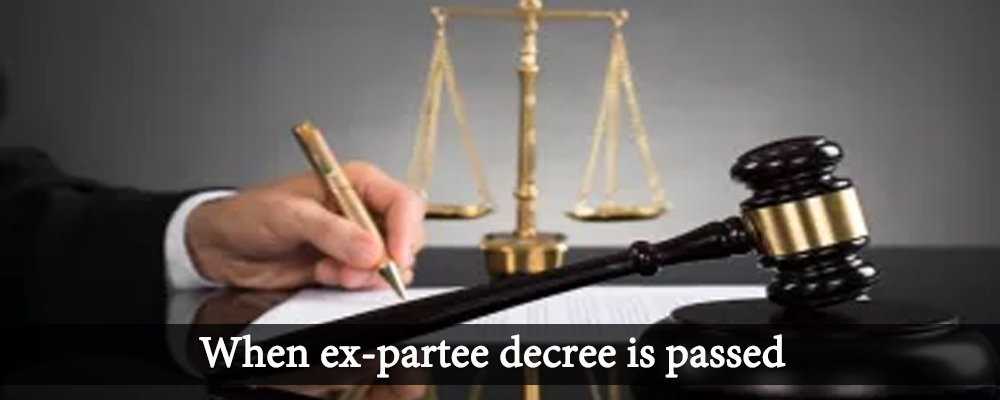Despite service of summons, on the date of hearing only plaintiff does and defendant does not appear in the court to hear the suit, hence court passes ex-parte decree against the defendant. The legal validity of such a decree is similar to any bi-party decree.
Code of Civil Procedure 1908, analyses various provisions of ex-parte decree i.e. one sided decision. Part I of the Code, talks about nature and cause of ex-parte decree. Part II deals with relief against ex-parte decree, Part III deals with sufficient cause for non-appearance and Part IV deals with remedies available against ex parte decree obtained by fraud.
Order 9 Rule 6(1) (a) states that:
Where the plaintiff appears but defendant does not appear:
i.) When summon is duly served
Court may pass an order that suit shall be heard ex-parte
ii.) When summon not served
Court may order second summon
iii.) Summon served but not in due time
If the summon is served after the date of hearing is already passed
Need A Legal Advice
The internet is not a lawyer and neither are you. Talk to a real lawyer about your legal issue

Consequences of non-appearance:
General rule says that both Parties shall be heard and proceedings shall not be at the disadvantage of the other Party
Rule 1:
Parties shall be present on the date of hearing by their respective pleaders and suit shall be heard unless adjourned by the court for the next date
Rule 2:
Dismissal of suit when summon not served because of Plaintiff’s fault of not paying the court fee, court may dismiss such case.
Rule3:
When neither party appears in the court for hearing the suit is dismissed
Rule 4:
Plaintiff may bring a fresh suit under Rule 2 or 3 and the court allows it thinking that there was a sufficient cause of failure to deliver the summons.
Rule 5:
When a summons has been issued to the defendant and returned undeliverable, the plaintiff has one month from the date of the return to the court to apply for the issuance of a new summons. If the plaintiff fails to do so, the court will order that the suit be dismissed as against that defendant unless the plaintiff proves to the satisfaction of the court within the one-month period that:
- He has failed after hi best efforts to find the residence of defendant
- Defendant is avoiding the process/summons
- There is any other sufficient cause for extending the time
Rule 6:
It is only when the plaintiff appears in the court
Rule 7:
When the defendant appears on the adjournment date the court asks the court if it feels the excuse given by the defendant can be admitted and can be heard.
Rule 8:
Court orders the dismissal of the suit
Rule 9:
Defendant may apply for the dismissal order aside and court is satisfied that there is sufficient cause for his non appearance court may set aside the dismissal order
Rule 10:
Suit will be proceeded if there are 2 or more plaintiffs and just one defendant is not appearing
Rule 11:
Suit will be proceeded if there are 2 or more defendants and just one defendant is not appearing
Rule 12:
Plaintiff or defendant will be governed by the above rules if court is satisfied that the excuse given by them is satisfactory





 Talk to a Lawyer
Talk to a Lawyer